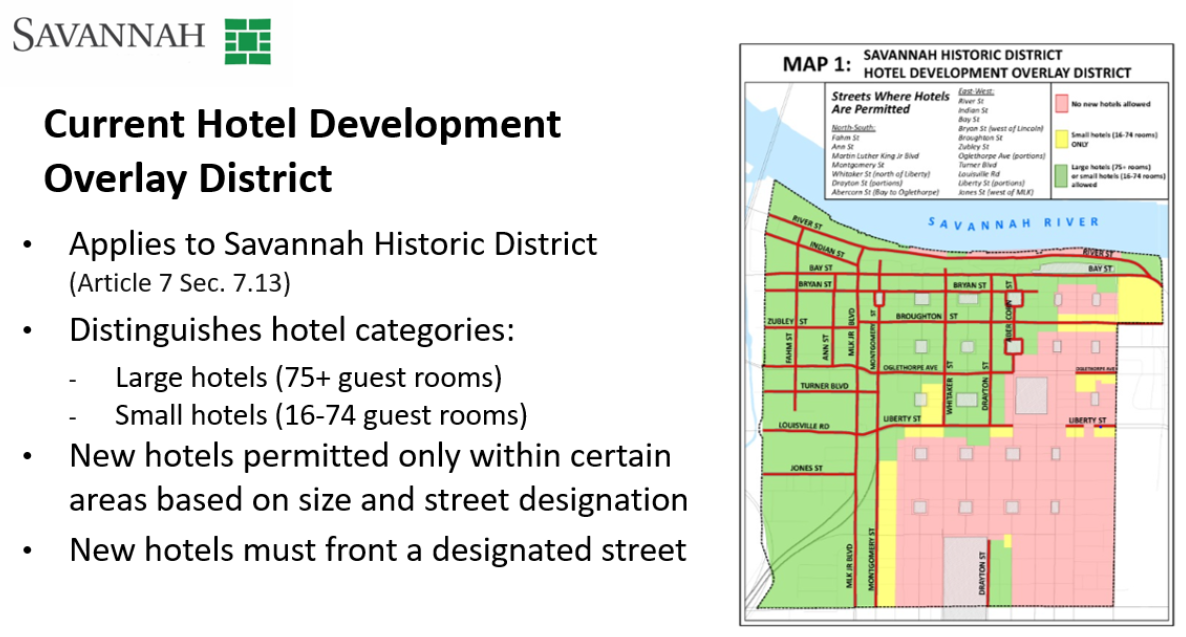LAST week’s meeting of the Metropolitan Planning Commission was dominated by flooding concerns about increased development on the Westside – and a taste of things to come with a proposed extension of downtown Savannah’s Hotel Overlay District.
A Master Plan change was approved to allow multifamily residential development in a portion of West Gwinnett Street abutting the Springfield Canal and across the street from the Enmarket Arena.
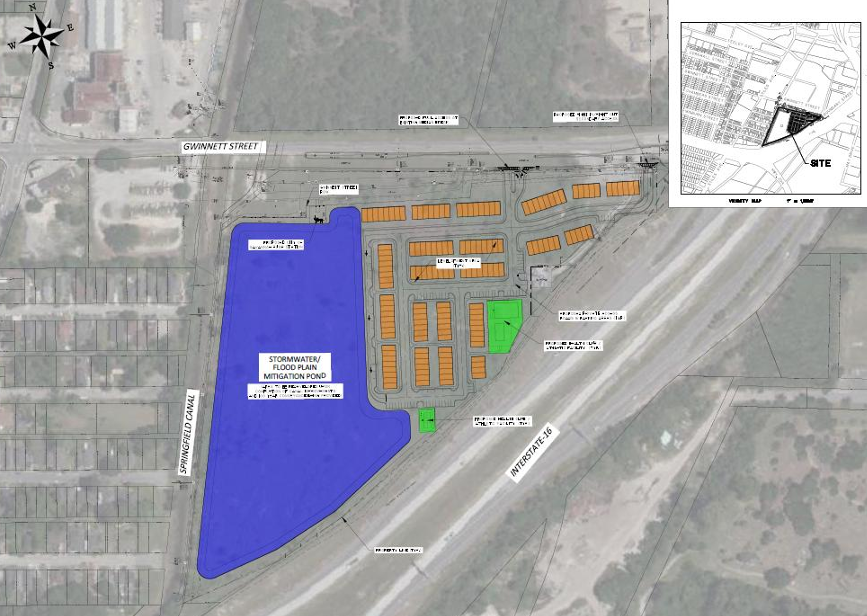
Saying “we aren’t a fan of this project overall,” Tonya Bonitatibus of the organization Savannah Riverkeeper pointed out to MPC commissioners that “This site is currently flooding, and neighborhoods around it are currently flooding. This project will likely exacerbate those issues.”
The 23-acre parcel, she said, “Probably needs to be maintained as a floodway conveyance, not an apartment complex.”
The parcel would have benefited from the $30 million FEMA grant for drainage improvements to the Springfield Canal that had been approved by the Biden administration – and then suddenly, and possibly unconstitutionally, rescinded by the Trump administration.
Using his words carefully, Savannah City Manager Jay Melder – who also has a seat on the MPC – explained the situation around that $30 million Building Resilient Infrastructure and Communities (BRIC) Grant:
“The City of Savannah was the recipient of the largest BRIC grant recorded. The current administration signaled their intent not to fund those projects – but we haven’t gotten a termination letter to date,” Melder said.
“We’re still hopeful that the current administration will realize the great benefit this will have for communities,” he said.
Melder said that two other options are being considered in the event that they receive official notice of cancelation of the grant.
One is a request from the City on the latest SPLOST list of requested projects. (SPLOST is the countywide Special Purpose Local Option Sales Tax of one percent.)
“There is $20 million on that list for backfill of that grant should it not come through,” Melder explained.
The other path is to work with the Georgia Emergency Management Agency (GEMA) to secure state-level funding.
The goal of that project, should it ever come to fruition, Melder said, is to “not only expand the canal capacity at the Springfield Canal south of Gwinnett, but also to improve drainage systems in Carver Village and Cloverdale” – two residential neighborhoods near the Canal and Arena district.
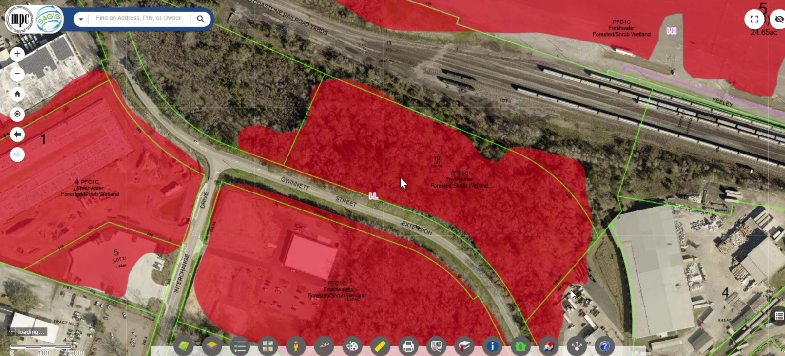
FLOODING was also mentioned with regards to the narrowly-approved petition by Poet Terminal to expand railroad capacity at a site at 2110 West Gwinnett.
Tonya Bonitatibus of Savannah Riverkeeper again spoke in opposition, and again referred to stormwater management issues.
“There’s no hardship in this petition. The landowner already has rail access elsewhere on the site,” she said.
The floodplain intended for further development, she said, “is all needed for flood conveyance.”
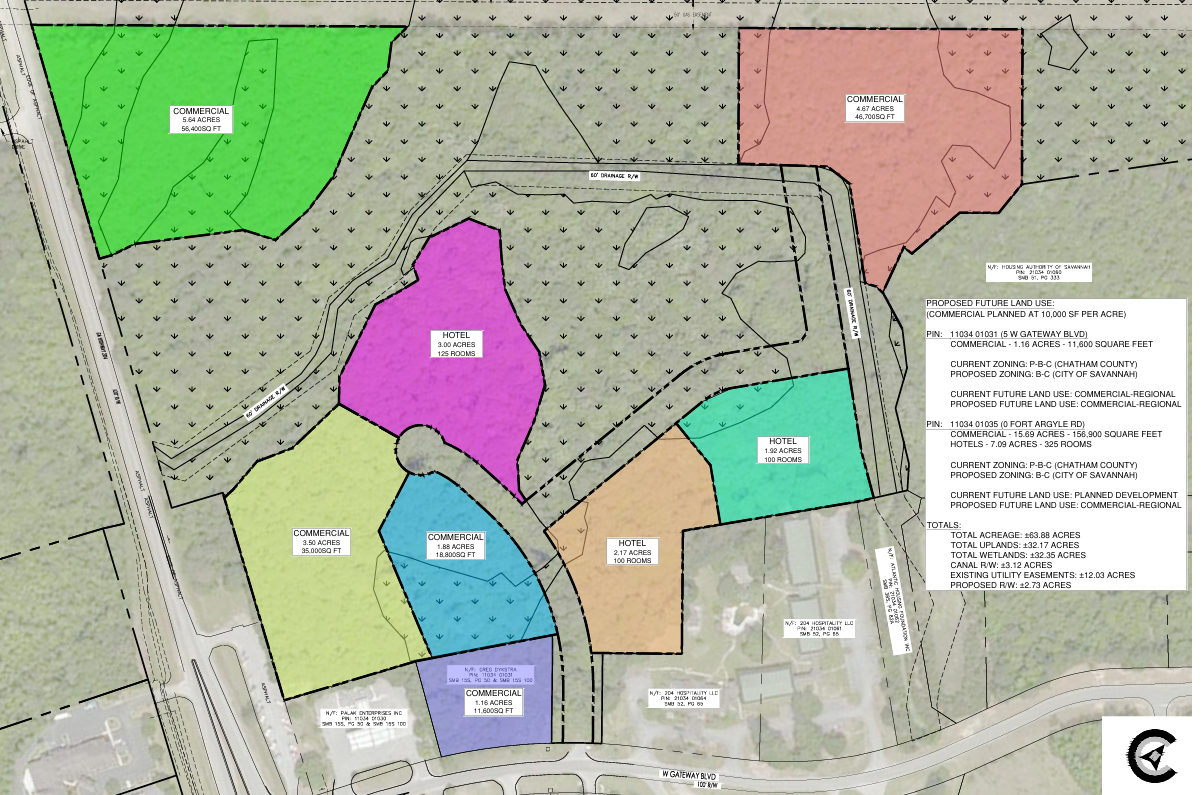
ANOTHER riverkeeper organization – Ogeechee Riverkeeper – spoke futilely against a proposed City of Savannah annexation in the busy West Gateway Blvd/Fort Argyle Road corridor just west of I-95, on land currently in unincorporated Chatham County.
The landowner has owned the parcel for 20 years. A brief previous attempt to clear the land was stopped by Chatham County due to a contractor being “overzealous,” in the words of the owner.
The project was approved with a list of conditions mostly involving wetland preservation and stormwater management.
The whole thing is contingent on the City of Savannah annexing the property and providing it with the necessary water/sewer infrastructure.
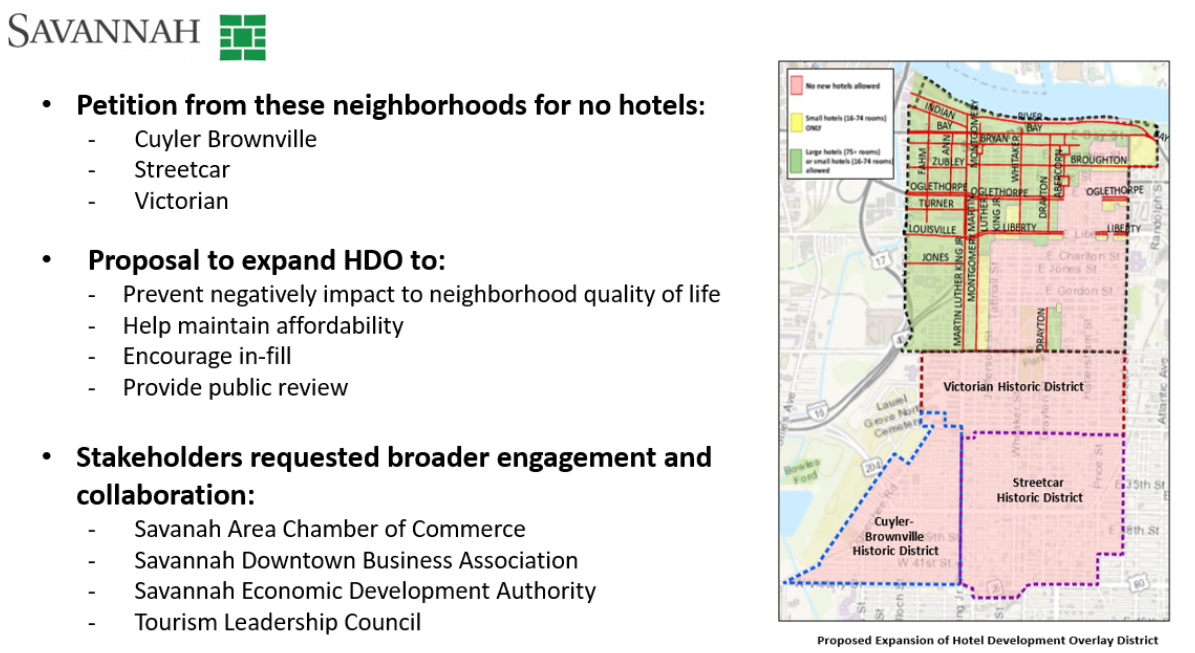
LASTLY, the MPC heard a presentation from the City’s Bridget Lidy on a proposed expansion of the current Hotel Overlay District.
It was arguably more remarkable for what was not said than for anything that was presented, however.
Several neighborhoods in Savannah want the current tight restrictions on new hotels in the Historic District – passed in 2018 – to be expanded to their neighborhoods.
Currently hotels from 16-74 rooms are only permitted in the Historic District proper through securing a Special Use Permit. No hotels larger than 74 rooms are permitted at all.
Lidy said that as part of responding to that request the City is also looking to tweak the definitions of what constitutes a hotel.
Possible amendments, Lidy said, include “adding hotel/motels at a smaller size from 16-40 rooms, a boutique style hotel.”
Also, potentially adding a mid-sized hotel category from 41-74 rooms.
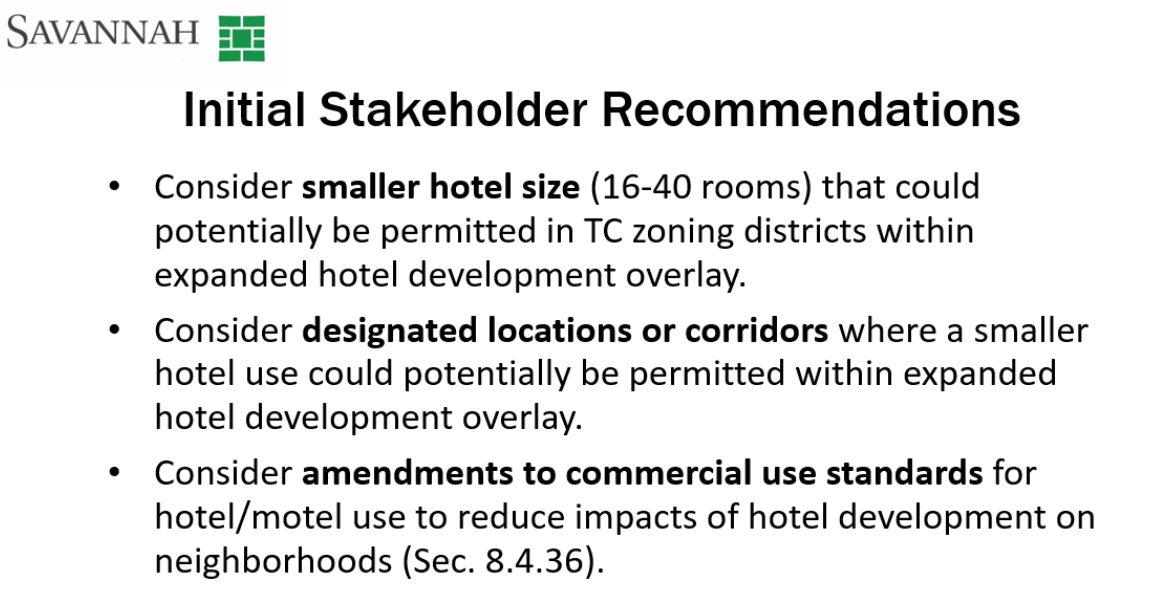
These tweaks, she said, mostly came from industry and tourism interests. But they have run squarely against neighborhood sentiment, which is overwhelmingly opposed regardless.
“That’s where we sort of got into the weeds,” Lidy said. “The neighborhoods continually advocate for no hotels, period.”
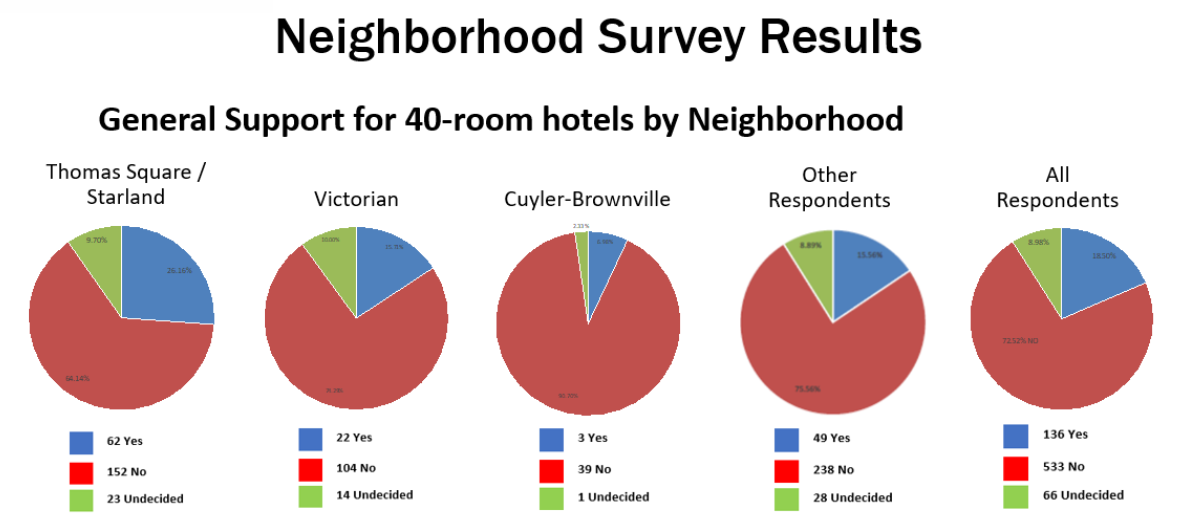
Long story short, Lidy presented three options moving forward:
Option 1: Allow hotels with 40 rooms or less in the expanded overlay district with Special Use permits
Option 2: Limit hotels to 40 rooms or less and only along the Anderson and Henry Street corridor from Whitaker to Drayton
Option 3: No hotels permitted at all in expanded Overlay District
This led to a revealing exchange involving MPC member Jeff Notrica, a local developer who also chairs the local Historic Preservation Commission.
Notrica, a controversial presence in the local development community, happens to own an undeveloped parcel that is right in the Option 2 area where a small hotel would potentially be permitted.
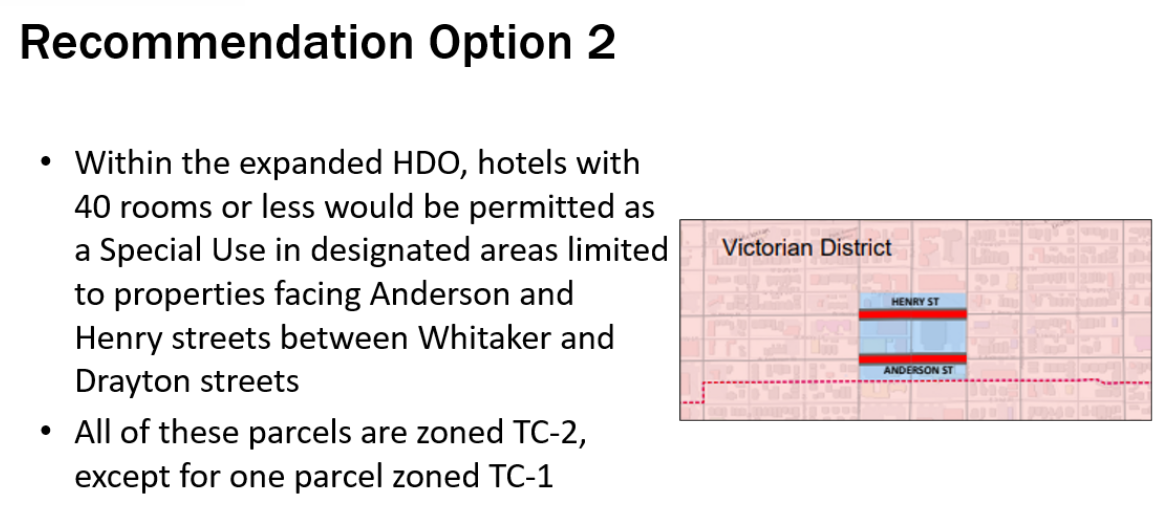
Notrica recently had that same parcel in front of the MPC and Savannah City Council to convert it to a paid parking lot – at least for the time being.
While Notrica expressed approval for Option 1 as the “most fair and balanced of the three,” he was also quick to get Lidy on the record as agreeing that small hotels would be permitted in the Overlay District if that option were chosen.
“If the overlay gets enacted it still won’t affect the inn provision? Or it will prohibit them?” Notrica asked Lidy.
“It will not. This is solely for the use of hotels,” Lidy replied.
“So inns 15 rooms and less will still be allowed?” Notrica pressed.
“Correct,” Lidy replied. “As is, nothing’s getting changed with that.”
Technically, one could make the case that Notrica was indulging a conflict of interest in even discussing these options given his property interest in the outcome – as a reading of the MPC by-laws might indicate:
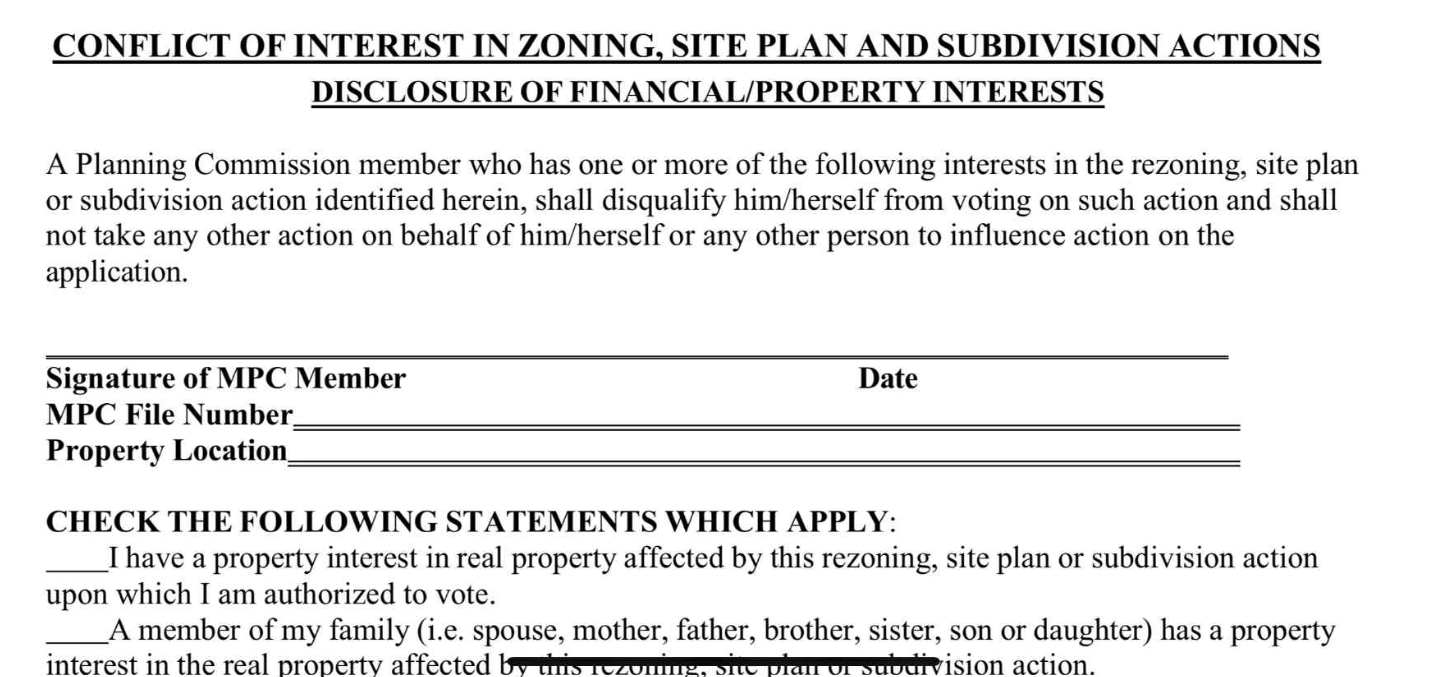
Lidy did mention that “maybe there’s a recommendation Number Four that comes out of this,” referring to any future deliberations.
“The neighborhoods I know are very passionate about what they want to protect, which is understandable,” she concluded.
“And I also know the industry is out there promoting their efforts. So it’s going to be a delicate balancing act.”

